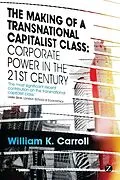Throughout the world, there has been a growing wave of interest in global corporate power and the rise of a transnational capitalist class, triggered by economic and political transformations that have blurred national borders and disembedded corporate business from national domiciles. Using social network analysis, William Carroll maps the changing field of power generated by elite relations among the world's largest corporations and related political organizations.
Carroll provides an in-depth analysis that spans the three decades of the late 20th and early 21st century, when capitalist globalization attained unprecedented momentum, propelled both by the transnationalization of accumulation and by the political paradigm of transnational neoliberalism. This has been an era in which national governments have deregulated capital, international institutions such as the World Trade Organization and the World Economic Forum have gained prominence, and production and finance have become more fully transnational, increasing the structural power of capital over communities and workers.
Within this context of transformation, the book charts the making of a transnational capitalist class, reaching beyond national forms of capitalist class organization into a global field, but facing spirited opposition from below in an ongoing struggle that is also a struggle over alternative global futures.
Autorentext
Bill Carroll is a professor of Sociology at the University of Victoria, where he directs the Social Justice Studies Program. His research interests are in the areas of the political economy of corporate capitalism, social movements and social justice, and critical social theory and method. Among his recent books are Remaking Media: The Struggle to Democratize Public Communication (co-authored with Bob Hackett), Challenges and Perils: Social Democracy in Neo-Liberal Times and Critical Strategies for Social Research. He has won the Canadian Sociological Association's John Porter Prize twice, for his books on the structure of corporate power in Canada. He has held visiting fellowships and appointments at the University of Amsterdam, Griffith University, Kanazawa State University, the Netherlands Institute for Advanced Study in the Humanities and Social Sciences and the Institute of Political Economy at Carleton University. He is a Research Associate with the Canadian Centre for Policy Alternatives, an associate editor of the journal Socialist Studies, and a member of Sociologists Without Borders.
Inhalt
Introduction
Part I: The Formation of a Transnational Corporate Community
1. Is there a transnational corporate community?
2. Forging a new hegemony: the transnational corporate-policy network, 1996
3. Global cities in the global corporate network
Part II: Into the 21st Century: The Changing Organization of Corporate Power
4. Transnational accumulation and global networking
5. Transnationalists and national networkers
6. Billionaires and networkers: wealth, position, and corporate power
Part III: A Transnational Historic Bloc?
7. Constituting corporate Europe
8. Consolidating the transnational corporate-policy network, 1996-2006
9. Hegemony and counter-hegemony in a global field
Conclusion
